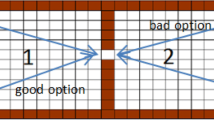Abstract
Reinforcement learning has become an established class of powerful machine learning methods operating online on sequential tasks by direct interaction with an environment instead of processing precollected training datasets. At the same time, the nature of many tasks with an inner hierarchical structure has evoked interest in hierarchical RL approaches that introduced the two-level decomposition directly into computational models. These methods are usually composed of lower-level controllers – skills – providing simple behaviors, and a high-level controller which uses the skills to solve the overall task. Skill discovery and acquisition remain principal challenges in hierarchical RL, and most of the relevant works have focused on resolving this issue by using pre-trained skills, fixed during the main learning process, which may lead to suboptimal solutions. We propose a universal pluggable framework of Adaptive Skill Acquisition (ASA), aimed to augment existing solutions by trying to achieve optimality. ASA can observe the high-level controller during its training and identify skills that it lacks to successfully learn the task. These missing skills are subsequently trained and integrated into the hierarchy, enabling better performance of the overall architecture. As we show in the pilot maze-type experiments, the identification of missing skills performs reasonably well, and embedding such skills into the hierarchy may significantly improve the performance of an overall model.
Supported by grant 1/0796/18 from Slovak Grant Agency for Science (VEGA).
Access this chapter
Tax calculation will be finalised at checkout
Purchases are for personal use only
Similar content being viewed by others
Notes
- 1.
ASA can be deployed on multiple levels of a multi-level hierarchy.
References
Bacon, P.L., Harb, J., Precup, D.: The option-critic architecture. In: AAAI Conference on Artificial Intelligence (2017)
Bakker, B., Schmidhuber, J.: Hierarchical reinforcement learning with subpolicies specializing for learned subgoals. In: International Conference on Neural Networks and Computational Intelligence, pp. 125–130 (2004)
Garage contributors: Garage: a toolkit for reproducible reinforcement learning research (2019). https://github.com/rlworkgroup/garage
Dietterich, T.G.: Hierarchical reinforcement learning with the MAXQ value function decomposition. J. Artif. Intell. Res. 13(1), 227–303 (2000)
Duan, Y., Chen, X., Houthooft, R., Schulman, J., Abbeel, P.: Benchmarking deep reinforcement learning for continuous control. In: International Conference on Machine Learning, pp. 1329–1338 (2016)
Florensa, C., Duan, Y., Abbeel, P.: Stochastic neural networks for hierarchical reinforcement learning. In: International Conference on Learning Representations (2017)
Goel, S., Huber, M.: Subgoal discovery for hierarchical reinforcement learning using learned policies. In: Florida AI Research Society Conference, pp. 346–350 (2003)
Kakade, S.M.: A natural policy gradient. In: Advances in Neural Information Processing Systems, pp. 1531–1538 (2002)
Konidaris, G., Barto, A.G.: Skill discovery in continuous reinforcement learning domains using skill chaining. In: Advances in Neural Information Processing Systems, pp. 1015–1023 (2009)
Kulkarni, T.D., Narasimhan, K., Saeedi, A., Tenenbaum, J.: Hierarchical deep reinforcement learning: integrating temporal abstraction and intrinsic motivation. In: Advances in Neural Information Processing Systems, pp. 3675–3683 (2016)
Levy, A., Konidaris, G., Platt, R., Saenko, K.: Learning multi-level hierarchies with hindsight. In: International Conference on Learning Representations (2019)
Li, A.C., Florensa, C., Clavera, I., Abbeel, P.: Sub-policy adaptation for hierarchical reinforcement learning. In: International Conference on Learning Representations (2020)
McGovern, A., Barto, A.G.: Automatic discovery of subgoals in reinforcement learning using diverse density. In: International Conference on Machine Learning, vol. 1, pp. 361–368 (2001)
McGovern, E.A., Barto, A.G.: Autonomous discovery of temporal abstractions from interaction with an environment. Ph.D. thesis, University of Massachusetts at Amherst (2002)
Menache, I., Mannor, S., Shimkin, N.: Q-cut—dynamic discovery of sub-goals in reinforcement learning. In: Elomaa, T., Mannila, H., Toivonen, H. (eds.) ECML 2002. LNCS (LNAI), vol. 2430, pp. 295–306. Springer, Heidelberg (2002). https://doi.org/10.1007/3-540-36755-1_25
Nachum, O., Gu, S.S., Lee, H., Levine, S.: Data-efficient hierarchical reinforcement learning. In: Advances in Neural Information Processing Systems, pp. 3303–3313 (2018)
Parr, R., Russell, S.J.: Reinforcement learning with hierarchies of machines. In: Advances in Neural Information Processing Systems, pp. 1043–1049 (1998)
Robins, A.: Catastrophic forgetting, rehearsal and pseudorehearsal. Connection Sci. 7(2), 123–146 (1995)
Schmidhuber, J.: Learning to generate sub-goals for action sequences. In: Artificial Neural Networks, pp. 967–972 (1991)
Schulman, J., Levine, S., Abbeel, P., Jordan, M., Moritz, P.: Trust region policy optimization. In: International Conference on Machine Learning, pp. 1889–1897 (2015)
Shu, T., Xiong, C., Socher, R.: Hierarchical and interpretable skill acquisition in multi-task reinforcement learning. In: International Conference on Learning Representations (2018)
Sutton, R.S., Precup, D., Singh, S.: Between MDPs and semi-MDPs: a framework for temporal abstraction in reinforcement learning. Artif. Intell. 112, 181–211 (1999)
Vezhnevets, A.S., et al.: Feudal networks for hierarchical reinforcement learning. In: International Conference on Machine Learning, pp. 3540–3549 (2017)
Author information
Authors and Affiliations
Corresponding author
Editor information
Editors and Affiliations
Rights and permissions
Copyright information
© 2020 Springer Nature Switzerland AG
About this paper
Cite this paper
Holas, J., Farkaš, I. (2020). Adaptive Skill Acquisition in Hierarchical Reinforcement Learning. In: Farkaš, I., Masulli, P., Wermter, S. (eds) Artificial Neural Networks and Machine Learning – ICANN 2020. ICANN 2020. Lecture Notes in Computer Science(), vol 12397. Springer, Cham. https://doi.org/10.1007/978-3-030-61616-8_31
Download citation
DOI: https://doi.org/10.1007/978-3-030-61616-8_31
Published:
Publisher Name: Springer, Cham
Print ISBN: 978-3-030-61615-1
Online ISBN: 978-3-030-61616-8
eBook Packages: Computer ScienceComputer Science (R0)




